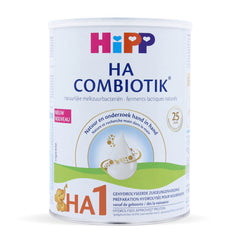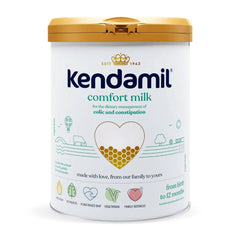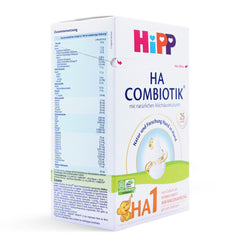Does Organic Formula Help With Constipation?
As a parent, there's nothing worse than watching your little one struggle with tummy troubles. Those sleepless nights when your baby is fussy, gassy, and clearly uncomfortable can leave you feeling helpless. If you're dealing with constipation issues, you're definitely not alone — it's one of the most common challenges new parents face.
What baby formula is good for constipation? Many parents have found relief by switching to organic formulas. But here's the thing: not all formulas are created equal, and what works for one baby might not work for another. Before we dive into solutions, let us be crystal clear — always consult your pediatrician before making any changes to your baby's diet. They know your little one best and can rule out any underlying issues.
That said, understanding your options can help you have more informed conversations with your healthcare provider. Organic formulas for constipation have gained popularity among parents precisely because they tend to be gentler on sensitive tummies. The key difference lies in their composition and the manner in which they're processed.
Why Some Formulas Cause Constipation
Let's talk about why this happens in the first place. Your baby's digestive system is still learning how to function properly — it's like a brand-new engine that needs time to break in. Some formula ingredients can make this process more challenging.
Iron fortification, while essential for your baby's development, can sometimes contribute to harder stools. Certain proteins, especially those that aren't broken down properly, can also be culprits. Then there are additives like corn syrup solids and palm oil — ingredients that some babies just can't tolerate well.
As a team of 8 experienced moms at Organic Life Start, we've collectively raised multiple generations of children, and one thing we've learned for certain — children instinctively choose what's best for them when given quality options.
We've identified the formula that is good for constipation. Through our collective research and parenting experiences, we've discovered that European organic brands, such as HiPP, Holle, and Kendamil, take a different approach.
The protein structure in organic formulas is often more easily digested. Instead of harsh processing methods, these best baby formulas for constipation use techniques that preserve the protein's natural state, making it less likely to cause digestive upset.
Can Organic Formula Ease Digestion?
Here's where things get interesting. Organic formulas aren't just about avoiding certain ingredients — they're about including the right ones. When one of our community moms, Sarah, had a baby struggling with constant gas and constipation, her pediatrician suggested looking into formulas with specific digestive aids.
Quality organic formulas typically avoid:
-
Corn syrup solids (known allergen triggers)
-
Processed palm oil (can affect calcium absorption)
-
Artificial additives that may cause gas or discomfort
Instead, they focus on the best formula for constipation and gas. Many include prebiotics and probiotics — the good bacteria that help establish healthy gut flora. Some also feature partially hydrolyzed proteins, which are essentially pre-digested to make them easier on tiny tummies.
Take formula to help with constipation — HiPP HA Formula Stage 1, for example. It's specifically designed for newborns up to six months and features hydrolyzed proteins with reduced lactose content. This combination can be a game-changer for babies with sensitive digestion. The "HA" stands for hypoallergenic, which means the proteins have been broken down to reduce the risk of allergic reactions and digestive issues.
What's the Best Formula for Constipation and Gas Relief?
If you're wondering what to look for in a constipation-friendly formula, here are the key features that actually make a difference:
-
Partially Hydrolyzed Proteins. Think of these as pre-chewed proteins. They're already broken into smaller pieces, so your baby's digestive system doesn't have to work as hard. This reduces the likelihood of gas bubbles and hard stools.
-
Probiotics. These beneficial bacteria are like tiny helpers in your baby's gut. They work to establish a healthy digestive environment and can significantly reduce constipation issues. Look for formulas that specifically mention strains like Lactobacillus or Bifidobacterium.
-
Prebiotics. While probiotics are the good bacteria, prebiotics are what feed them. They serve as food for the beneficial bacteria, helping them thrive and multiply.
-
Lactose Considerations. Some babies may benefit from a reduced lactose content, especially if they're prone to gas and constipation. Many organic formulas naturally contain less lactose than conventional options.
Kendamil Comfort is another formula that helps with constipation, that's gained recognition among parents dealing with these issues. It's designed for babies from birth to 12 months and specifically targets colic, gas, and constipation. What sets it apart is its unique fat blend, which doesn't include palm oil — a substance that can interfere with calcium absorption and contribute to harder stools.
Choosing the Best Formula for Newborn Constipation

Newborns are especially tricky because their digestive systems are still so immature. Everything is new to them, including figuring out how to process nutrition efficiently. If you want to know what the best formula is for constipation, timing is crucial — the sooner you address it with your pediatrician's guidance, the better.
For newborns, we've seen great results with formulas that closely mimic the composition of breast milk. HiPP HA Dutch Stage 1 is specifically formulated for babies 0-6 months with sensitive digestion. This baby formula, which helps with constipation, contains hydrolyzed proteins that are gentle enough for brand-new digestive systems while still providing complete nutrition.
The key is finding that sweet spot between nutritional completeness and digestive gentleness. Your baby needs all those essential vitamins, minerals, and fats for proper development, but they need them in a form their little system can handle.
Remember, switching the best formula for newborn constipation isn't always an instant fix. Sometimes it takes a week or two to see real improvements, and occasionally you might need to try a couple of different options before finding the right fit.
Practical Tips for Parents When Switching Formulas
Making a formula change doesn't have to be stressful. Here's what we've learned works best:
-
Start slowly. Mix the new formula with the old one, gradually increasing the ratio over 3-5 days. This helps your baby's system adjust without causing a shock.
-
Keep a feeding diary. Track everything — what your baby ate, when they had bowel movements, mood changes, and sleep patterns. This information is gold when discussing your child's health with your pediatrician.
-
Watch for changes. Some improvements might be subtle at first. Your baby may seem less fussy after feeds, or their stools become softer before they become more frequent.
-
Stay hydrated. If you're breastfeeding and supplementing with formula, be sure to drink plenty of water. If your baby is exclusively formula-fed, ensure they're getting adequate fluids between feeds (water isn't typically needed until 6 months, but discuss this with your doctor).
-
Don't go it alone. Connect with other parents, join online communities, and most importantly, maintain open communication with your healthcare provider.
When researching good formulas for constipation, look for certifications and read reviews from other parents who've dealt with similar issues. As the team behind Organic Life Start, we carefully curate our selection to include only formulas with detailed information about ingredients and manufacturing processes, helping you make informed decisions based on our collective decades of parenting experience.
The journey to finding the best formula for constipation can feel overwhelming, but remember — you're not just feeding your baby, you're helping them develop a healthy relationship with food from day one. Every baby is different, and what matters most is finding what works for your unique little one. With our combined experience raising multiple generations, we've learned that patience and persistence always pay off.
Trust your instincts, stay patient throughout the process, and don't hesitate to seek professional guidance when needed. Your baby's comfort and health are worth the extra effort it takes to find the perfect fit — and we're here to support you every step of the way.










